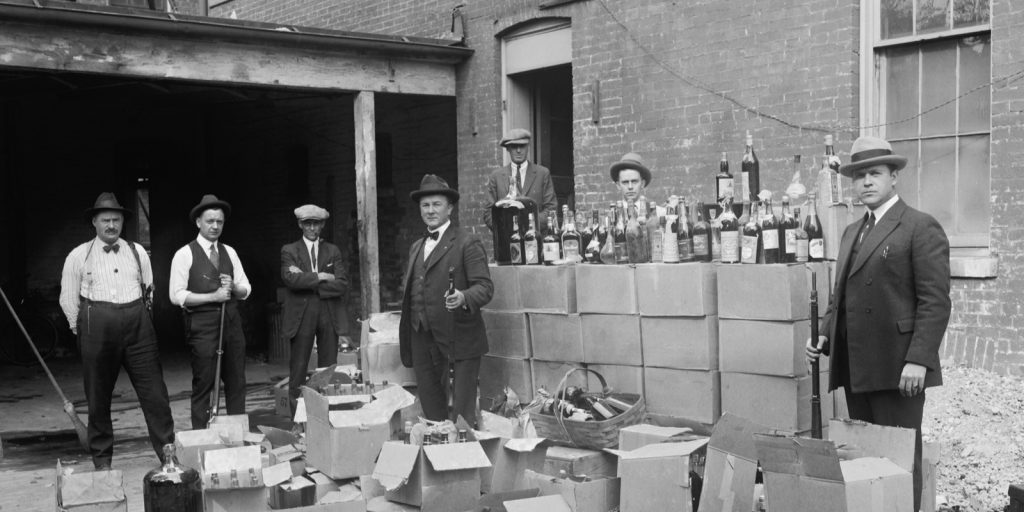
Stories continue to emerge about newly discovered illegal mining operations being busted by state and corporate authorities. Just last week Iranian media reported the seizure of 177 Bitcoin mining units worth over $270,000 being smuggled via truck in the Arak region. On July 31, Russia’s Kraskom power company reported illegal siphoning of power from municipal grids for mining, resulting in losses over $31,000. With incidents like this in no short supply, it is worth asking why people are willing to risk severe criminal punishment to mine crypto, and whether government monetary policy worldwide might play a role in creating such demand.
Also Read: Tax Expert: IRS Letters Confirm That Trading Cryptos Is a Taxable Event
Violent Legislation Doesn’t Work
As American economist Milton Friedman once so aptly observed, “Prohibition is an attempted cure that makes matters worse – for both the addict and the rest of us.” In the case of the historic U.S. prohibition on alcohol, it proves to be so. From the government literally poisoning people to death to stop alcohol consumption, to the proliferation of thousands of underground bars and speakeasies dealing with mob crime syndicates, the whole debacle was an abject failure, much like the so-called drug war of today. Prohibitionism always serves two roles: to distort the organic price and demand for the activity or substance, and also — by virtue of violence-backed laws and the violent markets they engender — to make it more dangerous.
Bitcoin mining restrictions can be viewed similarly in some respects. In light of current prohibitionary, fiat strangleholds on economies worldwide, crypto mining has become very lucrative. Thanks to the sound nature of Bitcoin and its limited supply, it would be lucrative regardless, but with prohibition added to the mix, markets are sharply and artificially dynamized. Whether it is the illegality (in some countries), or the systematic devaluation of fiat (everywhere), mining crypto pays and provides economic opportunity where the fiat status quo falls short. And while mining bitcoin might not be an addiction like alcoholism, folks are still willing to take great risks — even potentially life-threatening ones — to partake. In the name of freedom, and in the pursuit of survival and value.

Government-Manufactured Market Restrictions
State restrictions can make even the most benign of acts “crimes.” Selling raw milk, for example, is not a dangerous act in and of itself. However, introduce some violent legislature into the mix, and even this simple activity ends up culminating in the potential violation, kidnapping, and caging of a non-violent human being.
Independent bitcoin miners are similarly taking remarkable risks, whether they’re illegally stealing electricity to do so or not. The recent reported smuggling of 117 crypto miners in Iran is potentially punishable by death, for example. While mining is technically not prohibited there, operations must be state-approved and meet specific guidelines. Private mining and the use of bitcoin in commerce domestically are both banned as per new legislation passed on August 4. 
A Fiat Pressure Cooker
Some wonder why these rogue miners don’t just wait until the dust settles, get licensed and certified, and start mining then, legally and safely. This may be akin to asking why the impoverished teen drug dealer in Chicago’s housing projects doesn’t just go apply for a bank loan. Crypto has been an effective means for Iranians to help stave off economic hardships brought on by crippling U.S. sanctions, and a fiat currency that’s inflating rapidly. Many likely don’t have the time or resources to wait on sluggish governments to move or approve. According to a recent report by the Congressional Research Service:
The reinstatement of U.S. sanctions has driven Iran’s economy into recession as major companies exit the Iranian economy rather than risk being penalized by the United States. Iran’s oil exports have decreased significantly, the value of Iran’s currency has declined sharply, and unrest has continued.
As for reported power theft in Russia, motives don’t seem so easy to guess. Those involved could be facing up to five years in prison for outfitting a building with mining rigs and connecting illegally to local power grids. While that’s not an Iranian death sentence by any stretch, it’s a sizeable risk all the same. There was also a large bust last year in Taiwan, involving fake storefronts and rigged electric meters to avoid detection from power companies.
Whether these other cases are people just trying to survive in a fiat paradigm with few options for security, or simply exercises in getting filthy rich, is up for debate. However, economics maintains that when more resources and opportunities are available to the individual market actor, supply and demand equilibrium can be more closely approached. To unilaterally throttle markets under the color of law as governments do is to ensure that unnaturally high, imbalanced prices favorable to criminal enterprise are maintained. To quote Friedman again:
See, if you look at the drug war from a purely economic point of view, the role of the government is to protect the drug cartel. That’s literally true.
Of course, even in the best of circumstances there will still be bad actors who steal and rob, but the problem is exacerbated immensely by the fiat lockdown and forced monopoly on resources and activities — including power itself — via government money and licensing rackets. For example, in many places in the U.S. it is illegal to save one’s own private solar power without first striking a deal with the local, government-embedded power company.

Stealing Purchasing Power
When purchasing power is degraded, market actors naturally seek out more secure and advantageous options. Selling illegal drugs, operating an unlicensed business, finding creative ways to avoid taxes — these are all ways to improve one’s position in a paradigm where the only legal currencies are unsound, and where the economic habitat often resembles a pit of starving dogs fighting each other just to stay out of debt under the king’s table.
On top of all the prohibitive rules, governments worldwide continue hypocritically stealing power from individual market actors by exploiting the very markets they outlaw for private individuals. Iran is setting up a national legal structure for crypto mining and is working on its own gold-backed crypto token. The IRS is sending warning letters to crypto holders in America and in effect corralling them into centralized, government-regulated exchanges. Strange behavior from groups claiming crypto is made from “thin air,” has no value, and is used largely by terrorists.
People Mine for Gold, Not Garbage
One day it will be absurd to imagine someone going to jail for mining crypto, as it is today to imagine getting arrested for drinking a beer on the sofa and watching TV. The track record of various prohibitions speak for themselves. The war on drugs has cost American taxpayers over $1 trillion since 1971, and yet 451,000 individuals remain incarcerated on any given day, for non-violent drug offenses. According to some sources, around 10,000 died during America’s alcohol prohibition by way of the government-poisoned industrial alcohol. Private bitcoin and crypto mining are currently being criminalized around the world, even in countries where the licensed practice is legal for select, government-approved parties.
Removing these violent restrictions would bring balance to the global economy, allowing black market bubbles to pop, and value to seep back into the free market. At the very least, the systematic violence perpetrated on innocent people for non-violent activities (like mining crypto) would stop. Portugal’s decriminalization of drugs is an example of this. As is the American prohibition being repealed. All this seems very obvious, and yet the state continues violently forcing itself upon anyone and everyone, demanding use of their garbage play money, or else. Go home, government, you’re drunk.
What do you think about state restrictions on bitcoin mining? Let us know in the comments section below.
OP-ed disclaimer: This is an Op-ed article. The opinions expressed in this article are the author’s own. Bitcoin.com is not responsible for or liable for any content, accuracy or quality within the Op-ed article. Readers should do their own due diligence before taking any actions related to the content. Bitcoin.com is not responsible, directly or indirectly, for any damage or loss caused or alleged to be caused by or in connection with the use of or reliance on any information in this Op-ed article.
Images courtesy of Shutterstock, Twitter, fair use.
Did you know you can buy and sell BCH privately using our noncustodial, peer-to-peer Local Bitcoin Cash trading platform? The Local.Bitcoin.commarketplace has thousands of participants from all around the world trading BCH right now. And if you need a bitcoin wallet to securely store your coins, you can download one from us here.
The post From Booze to Bitcoin Mining – Why Violent Prohibition Is Always Harmful appeared first on Bitcoin News.

Bitcoin.com is author of this content, TheBitcoinNews.com is is not responsible for the content of external sites.
Our Social Networks: Facebook Instagram Pinterest Reddit Telegram Twitter Youtube











